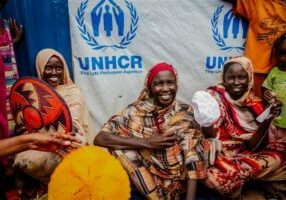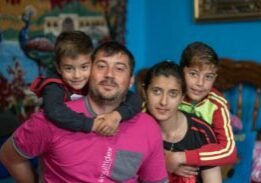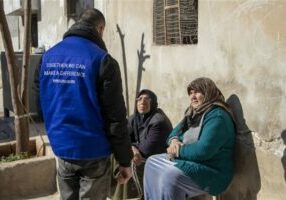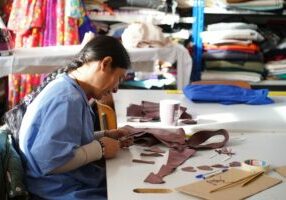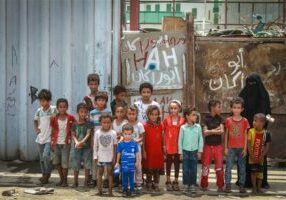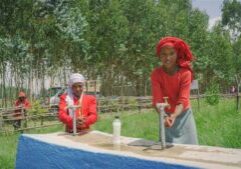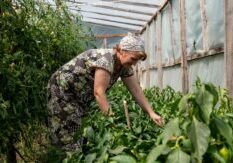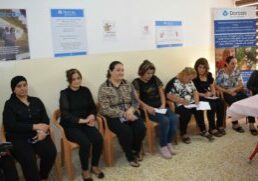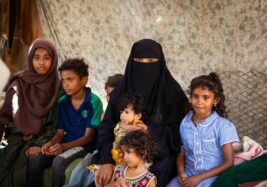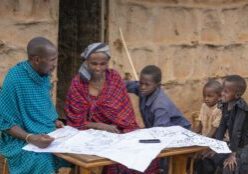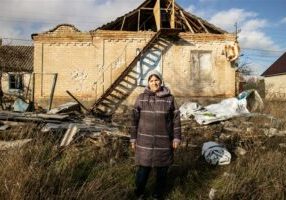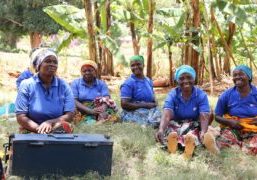Kenya: Enabling vulnerable groups to build their resilience and tackle the effects of climate change
In 2010 Kenyans went en masse to the polls to vote for a new constitution - an event which altered the country forever. Today, having earned its status as a middle-income country; as well as East Africa's largest economy, Kenya is one of the continent's biggest success stories.
Yet the country's road to rebirth - shadowed by a history of ethnic land grievances and political violence - is riddled with hurdles. An economy struggling to keep up with rapid population growth has seen more than a third of youth eligible for work go jobless. Kenya's water and sanitation crisis is escalating - 70 per cent of Kenyans do not have access to a hygienic household toilet with illness and disease rife. In rural areas, the backbone of African livelihoods, women and girls are left behind - denied equal property and inheritance rights and at added risk of violence and harmful cultural practices.
Climate change is the next big threat. In fact, it is right here with us. Back-to-back drought, floods and a locust upsurge have diminished food security and aggravated existing vulnerabilities across the country. Maize production has been progressively declining over the years due to effects of climate change.
Population
Kenya has a population of 57.3 million people
Poverty
Some 16.4 million people are living below the poverty line
Our Reach
In 2022 150,722 people participated in our programmes
What we do in Kenya
Overview
We work to protect and support poor and marginalised groups in Kenya through community-based programmes, such as WASH and value chains. Our programmes are designed to improve their psychosocial and physical wellbeing. Our approach focuses on creating sustainable livelihoods opportunities for enterprising people, particularly women and youth, in remote regions hit hard by climate extremes.
Water, Sanitation and Hygiene
Through our water, sanitation and hygiene (WASH) programmes we work to improve sanitation facilities and access to clean drinking water. The development of local businesses, particularly microfinance organisations, is key to our approach. We also promote good hygiene practices through awareness-raising and health messages and stimulate entrepreneurs to scale up sanitation services in their community - in close collaboration with county governments and business.
Business Development
Kenya is an agricultural country and, as a consequence, has already been feeling the significant consequences of climate change. To prevent more problems, action must be taken. This is especially important since such a large part of Kenya’s working population, their families and their communities depend on their farms, their crops and their stocks for their livelihood. That is why it is necessary to implement a new approach to farming. That is why we have set up three projects. These projects focus on products that are high in demand, while low in supply, such as honey.
Social Protection
Poverty has been associated with malnutrition and increased food insecurity. Children are more likely to be out of school, stunted, deprived of healthcare and nutrition. They also tend to be deprived of health-related knowledge and education. And this may lead to other problems in the future. These problems do not occur only in children, all other generations are affected as well. It is clear that poverty needs to be addressed and that’s exactly what we have been doing.
Climate Change
Climate resilience in Kenya is defined from the adaptation point of view. That is why we aim to slightly change the modus operandi, so that resilience is felt at all levels in the country, including the lower levels. We believe in justice for all and especially for those who are living in extreme poverty. Unfortunately, this subset of the community is hit the hardest by the climate crisis.
Agricultural Value Chains - The Small-Holder Revolution
More than 80 per cent of land in Kenya is arable. And while 40 per cent of the population work in agriculture, the sector accounts for only 26 per cent of Gross Domestic Product (GDP). While many debate the roots of this stagnation, the playing field has already changed - a landscape crippled by climate change and growing numbers in need.
Farmers accustomed to rain-fed farming systems are being pushed into arid areas on the fringes of society where persistent drought and unpredictable weather patterns hamper their means to survival. Where once agriculture was seen as the best income option for rural communities, now its ability to lift households out of poverty is waning. New approaches and a fresh mindset are urgently needed.
News
Our partners
Programme Partners
- Kitise Rural Development
- Muangeni Rural Development
- North Gem Community Development Program
- Shokut Naretoi Community Development Program
Strategic Partners and Donors
- Maji Milele Limited
- Netherlands Enterprise Agency
- Siaya County Government
- Mwangaza Light
- Kenya Agriculture Livestock and Research Organisation
Meet our Country Director...
Edwin Onyancha - Country Director Kenya
"Climate change is adversely affecting Kenyan lives through rising temperatures, erratic rainfall and drought - and people feel powerless to stop it. We need to act now in unison and at the international, national and local level. That's why my team continuously enlists the support of different actors such as county governments, NGOs and the private sector. These strategic partnerships allow us to unlock climate finance, invest in resilient infrastructure and implement adaptation measures faster. This is how we prepare communities."
Contact Dorcas Kenya
Address
Mailing Address
P.O Box 76495, 00508
Nairobi, Kenya
Physical Address
May East Rd, off Langata South Rd. Karen
Nairobi, Kenya
+254-736-261137
Email address
kenyaoffice@kenya.dorcas.org
